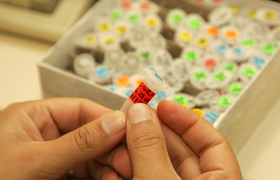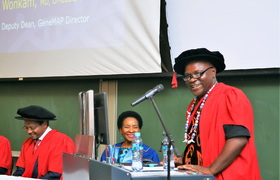Diversity in research: a new focus for neurogenetics
31 January 2020 | Story Nobhongo Gxolo. Photo Flickr. Read time 8 min.
This week several University of Cape Town (UCT) Faculty of Health Sciences researchers published an article in Science, one of the world’s most prestigious journals, on the genetics of schizophrenia in South Africa. “ Genetics of Schizophrenia in the South African Xhosa ” emphasises that rare genetic mutations may play an important role in the cause of the illness.
The “Out of Africa” theory is widely accepted as the overriding model for mankind’s geographic origin. It locates the continent as the “ancestral home of all modern humans”. This makes Africa the most informative geography in understanding the human genome blueprint – and the role this plays in the formation of complex disease.
According to co-author Professor Dan Stein – head of UCT’s Department of Psychiatry and director of the South African Medical Research Council Unit on Risk & Resilience in Mental Disorders – the World Mental Health Survey consortium and the Global Burden of Disease studies have emphasised how prevalent and burdensome mental disorders are. He added, “Schizophrenia is an important component of that.”
This mental illness is often misunderstood and mislabelled as a “split personality” or “split mind”. Schizophrenia has nothing to do with a split mind. Instead, it is a serious mental disorder in which the sufferer endures symptoms that include hallucinations and delusions, which often lead them to lose touch with reality. The disorder causes immense suffering to tens of millions of people across the globe. It is one of the most common reasons for psychiatric hospitalisation – and South Africa is no exception.
“Participants with schizophrenia were significantly more likely to carry rare, damaging genetic mutations.”
Co-author Professor Raj Ramesar, head of the Department of Pathology and Division of Human Genetics at UCT, offered insight into the current study’s findings: “Participants with schizophrenia were significantly more likely to carry rare, damaging genetic mutations compared to those without. These rare mutations are also likely to affect brain and synaptic function.”
Stein elaborated: “Synapses play a key role in the communication between brain cells, and so are crucial for understanding the brain-mind.”
Stein and Ramesar noted that through their membership the study brings together UCT’s Neuroscience Institute and the Institute of Infectious Disease and Molecular Medicine. In addition, the work was done in collaboration with renowned geneticists Mary-Claire King and Jack McLelland, the epidemiologist and schizophrenia expert Ezra Susser, the neuropsychology expert Ruben Gur, and National Institutes of Mental Health (NIMH) geneticist Thomas Lehner. Various colleagues around the country also contributed to the success of this study, including Professor Zuki Zingela at Walter Sisulu University and Professor Mo Nagdee at Walter Sisulu and Rhodes University. The study received backing from a South African philanthropist who supports local neurogenetics research.
The diversity issue
Precision medicine is founded on enhancing the clinical practise of medicine by relying on, among other things, the use of molecular biomarkers to determine how at risk a patient is, what their prognosis looks like, and possible therapeutic interventions that might be introduced. But this has the potential to be unreliable and become particularly challenging for diverse populations that are often underrepresented in this research.
An article titled “Genomics is failing on diversity”, published in Nature, highlights this point.
“[Avoiding] exacerbating current inequity in health, there is an urgent need to fully engage unrepresented ethnic groups in both the discovery and the application phases of genomic science” is a sentiment in a study echoing the importance of diversity – and so the inclusion of African and other underrepresented populations in research.
There are major health inequalities around the world. If genetics research is only done in high-income countries, then such health disparities may further increase. To date, the vast majority of genetics research on mental disorders has been undertaken in populations with Caucasian ancestry, and there is a crucial need to extend this work to include more diverse populations so that they too can benefit from advances in genetics.
“There is an urgent need to fully engage unrepresented ethnic groups in both the discovery and the application phases of genomic science.”
The current study was undertaken not because the Xhosa have an unusual prevalence of schizophrenia, but because there is a need for genetics work in African populations, and because these populations have the greatest wealth of human genetic diversity.
Importantly, the depth of genetic variation in Africa allowed findings on schizophrenia to emerge using a moderate sample size, and this helps inform our understanding of the genetics of schizophrenia worldwide.
Ramesar continued on this point: “We all share the vast majority of our genome. As a tool when looking at the relationship between populations, we look at the tiny bits that we know we vary by, and these can provide insights. We’re keen on findings that will lead to better management of the illness locally. To some extent it’s still very early. Schizophrenia is a combination of mutations and various other factors.”
The ethics of things
In clinical studies it is important that the highest ethical standards are adhered to. For the current study the researchers took measures to ensure this.
One challenge for genetics research on serious mental disorders is ensuring that participants provide fully informed consent. Stein noted that the team used stringent measures to assess whether participants fully understood the study. One of the first publications from the study detailed how a structured instrument was used to make sure that participants understood the aim of the research.
Ramesar noted that the study also set up a Community Advisory Board (CAB) in order to ensure appropriate engagement with the community.
“We made sure that our researchers were members of the community who could speak the home language of participants. We also carefully translated questionnaires, with the assistance of Prof Zingela.”
Ensuring that both community and patient voices were represented in the research was important. Co-author Dr Goodman Sibeko, head of the Division of Addictions Psychiatry at UCT, noted that the CAB provided valuable insights into the conduct of the current study. This resulted in another early publication from the study that focused on community engagement.
“We made sure that our researchers were members of the community who could speak the home language of participants.”
Regarding consent, Stein said, “It is true that people with a mental disorder may be vulnerable in key ways. However, mental health advocates, including people with these conditions, have been vocal in their calls for more research on mental disorders. So, we need to be careful of stereotyping people with mental disorders. They can understand the need for research, and we should not withhold from them the right to participate in such work.”
The Human Heredity and Health in Africa (H3Africa) consortium is focused on facilitating research into diseases in Africa. The consortium is concerned with building infrastructure, resources, training, and ethical guidelines to assist in the development of a sustainable African research enterprise “led by African scientists, for the African people”.
The late Professor Bongani Mayosi, former dean of the UCT Faculty of Health Sciences, was an advocate for the importance of genetics in Africa and played a key role in H3Africa.
The current study was part of the H3Africa consortium, and was funded by the NIMH.
 This work is licensed under a Creative Commons Attribution-NoDerivatives 4.0 International License.
This work is licensed under a Creative Commons Attribution-NoDerivatives 4.0 International License.
Please view the republishing articles page for more information.










